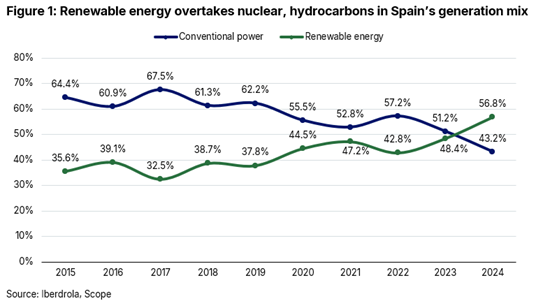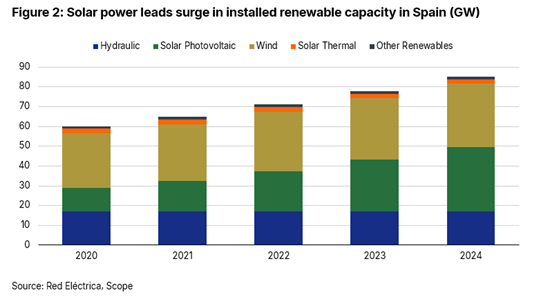Announcements
Drinks
Spain’s renewable energy push risks running into reliability, pricing, investment obstacles
By Antonio Escudero Castiella, Project Finance
The authorities and industry recognize the urgency of creating a more flexible, better-interconnected system capable of balancing renewable generation with demand and storage while enhancing the resilience of the network.
Failure to do so would work against Madrid’s plans to boost growth through investment in energy-intensive sectors like gigafactories, data centres, green hydrogen and biofuels.
However, political gridlock in Spain’s divided parliament, which has recently complicated the passing of the budget, has hampered efforts to modernise regulation and accelerate grid investment. Parliament has not approved important energy reforms.
The April 2025 Iberian blackout and legislative delays are a reminder that grid resilience and policy clarity cannot be taken for granted even in one of Europe’s most advanced renewable markets (Figure 1).

Spain has recorded growth in capacity amid improved regulatory framework
Spain’s installed electricity capacity, including generation and storage, hit a high of 132 GW in 2024, up 4.6% from the previous year. However, the system is operating at over 83% of its distribution capacity (83% of the nodes are saturated)– a warning sign over its future ability to connect new demand.
At the same time, renewable generation exceeded traditional generation (almost 57%), the culmination of a decade-long ramp-up of solar and wind capacity. Total installed capacity from renewable sources rose to 85.1 GW, putting Spain among the top 10 countries in terms of renewables capacity and second in Europe behind Germany.
The growth has come as government did revamp regulations in 2020 to provide greater certainty to developers and facilitate financing. The goal was to ensure Spain meets its Integrated National Energy and Climate Plan (PNIEC) to increase installed capacity by more than 60% to 214GW by 2030, with renewable energy the focus of growth (Figure 2).

PPAs play important role in Spain’s energy-sector finance
The new auction-based remuneration framework, known as the Regimen Economico de Energias Renovables (REER), is an improvement on the old system by working like power purchase agreements (PPAs) in which the buyer is the wholesale market and sellers are the respective generation facilities that have won the auction at the awarded strike price.
That said, private PPAs remain an important part of energy-sector financing in Spain. The country again recorded the most private PPAs in Europe in 2024, with 47 new ones signed though the volume fell 5.5% to 4.66 GW.
In any case, further capacity growth is possible only if new investments are made in Spain’s electricity grid.
Negative, zero electricity prices reflect three problems in energy sector
However, when it comes to electricity pricing, Spain has recorded a rising number of hours in which wholesale electricity pricing is zero or negative. For example, one in every eight hours of trading was settled at virtually zero or negative prices in 1H2025, reflecting the system’s growing exposure to periods of excess renewable generation.
Negative or zero prices make it difficult for electricity providers to cover costs and obtain financing with an adequate return for investors, particularly for projects without long-term contracts or storage capacity. Three structural factors explain this trend:
- A widening gap between the rapid increase in the supply of renewable energy and slower increases in industrial and householder demand.
- Insufficient storage capacity and limited cross-border interconnectors with France, Portugal and Morocco creates bottlenecks.
- When solar and wind output is high, these generators bid at or near zero prices. In a market that operates on a marginal bidder basis, zero marginal cost renewables push down market prices. For conventional generators, negative prices may be rational given start-up and shut-down costs.
Matching additional electricity demand with new grid investments and storage is key to reducing negative prices, making investments attractive and bankable, and helping the country achieve its capacity targets by 2030.
Questions remain over resilience of Spain’s grid after April blackout
As for the resilience of the Spanish grid, the reasons for the 18-hour blackout in April remained disputed. The Association of Electricity Companies (AELEC), of which Endesa, EDP and Iberdrola are members, holds grid operator Red Eléctrica de España (REE) responsible. The European Network of Transmission System Operators for Electricity (ENTSO-E) is investigating the blackout but, with a final report pending, has not yet determined a root cause. In recent weeks, REE has detected sudden voltage fluctuations that could cause another blackout.
Neither the government nor REE blame renewable generation for the blackout, but some experts believe that a system increasingly reliant on intermittent energy is more susceptible to supply-demand imbalances and renewables lacks the inertia provided by conventional power plants.
The government sought parliamentary approval for measures to improve grid resilience, storage, capacity, and operational flexibility, but political divisions prevented their passage in July. Meanwhile, Madrid is committed to phasing out nuclear power by 2035.
Industry says more investment in power grid is urgently needed
Spain’s utilities warn there is some urgency in addressing shortfalls in grid investment. The federation of the European electricity industry (Eurelectric) has argued that, at around EUR 2bn a year, or 0.13% of GDP, investment is running at half of what is required.
In response, the government has proposed a plan for new network investment, envisaging EUR 7.7bn in electricity distribution and EUR 3.6bn in transmission by 2030.
However, the rate of return of 6.46% for the new regulatory period 2026-2030 proposed by the National Commission for Competition and Markets (CNMC) is well below the 7.5% that Spanish utilities consider necessary for investment to take place.
Iberdrola recently announced a EUR 9bn investment plan in Spain in 2025-28, with EUR 4bn allocated to networks. The company made clear, however, that deployment of this capital will depend on a regulatory framework that ensures sufficient returns.
This underscores how regulatory clarity and adequate remuneration are central to mobilising the scale of private capital needed for Spain’s energy transition.
The findings of ENTSO-E’s forthcoming final report, together with Spain’s 2030 grid-expansion targets, will shape how the country strengthens its electricity infrastructure in the next decade.
Jakob Suwalski (Sovereign and Public Sector) and Herta Loka (Corporates) contributed to this research.







